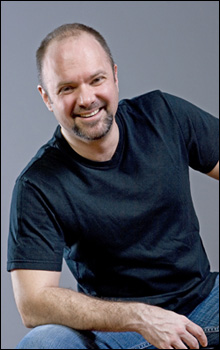
HOPEFUL: “[Paris by Night] is truly the single
most important, most meaningful thing I’ve
ever worked on,” Columbus says.
|
Trinity Rep artistic director Curt Columbus has been so tied up in the theatrical nuts and bolts of staging the world premiere of Paris by Night (through June 1), for which he wrote the book and lyrics, that he didn’t delve into the most important aspect until our interview was over and he was saying goodbye.
“It is truly the single most important, most meaningful thing I’ve ever worked on, because it means so much to me personally — and I keep hoping that some 17-year-old gay boy is going to come to this and see himself reflected in a love story and not go through the years of self-loathing and self-doubt that I went through,” he declared.
Columbus continued: “When I was a kid, I’d watch The Sound of Music and think, ‘Well, then I don’t get to have love like that because I’m different.’ And I know this is what love is, right, because I can see it on the TV. ‘Oh, I’m not in there.’ So if you’re missing, then you spend a lot of your life looking and looking in all the wrong places.”
The production — a play with music rather than a musical, he insists — has music by Andre Pluess and Amy Warren and is directed and choreographed by Birgitta Victorson, all of whom he has worked with before.
Set in 1960, Paris by Night weaves together the love stories of two couples. African-American expatriate Sam (Joe Wilson, Jr.) had his heart broken once and has soured on romance, but he meets a young soldier named Buck (James Royce Edwards), whose optimistic disposition brings Sam out of himself. In addition, we have the beautiful nightclub singer Marie (Rachael Warren) who has been living the torch song tradition of loving a man who treats her wrong, Frank (Mauro Hantman), while overlooking the man who really cares for her, Patrick (Stephen Thorne).
Now, that sounds like it could be pretty campy. So, Columbus was asked, wasn’t he working at a disadvantage, not wanting it to come across that way while the above scenario draws that expectation? The world hardly needs another La Cage Aux Folles, entertaining but relying on gay stereotypes.
“Bingo,” Columbus replied. “In fact, when I would give early drafts of this to people to read, they would say, ‘So, I get that it’s really campy, right?’ And I’d say, ‘No. It’s supposed to be real.’ ‘Oh, then I don’t get this at all.’ ”
After a “disastrous” Chicago reading in the early 2000s, the playscript sat in his drawer for years. Beginning with input from Trinity Repertory Company actors in the fall of 2006, he has rewritten the play “substantially” and workshopped it with them a couple of times. Columbus pointed out that developing a production this way, with actors who are going to create the roles, doesn’t often happen.
“Disney doesn’t get to do that,” he said.
“We’d do runthroughs, and then we’d tear the script apart again, run the scene and tear apart,” he described. “It’s been enormously useful to the development of the script.” And the result sounds like the difference between custom-tailored and off-the-rack.
“As soon as Joe Wilson read the character of Sam, I was like, ‘Oh my god! That was the voice I’ve heard all along!’ ” he said. “Joe gets the style. Rachael gets the style. Mauro and Stephen got the style.”
Columbus had envisioned a William Holden type for the character that Stephen Berenson plays, but after a reading he realized that the actor’s interpretation was the way it should have been all along. Janice Duclos wanted to play the waiter and did
it so well that he wrote a song for her as Henrietta, the owner of the café.
That’s especially important for this sort of show, because it’s intended to be character-driven like a straight play, if you will excuse the unavoidable pun, rather than song-oriented like a musical, with a big production number closing the first act and such. Instead of song-and-dance numbers, Columbus wanted songs that are “almost like Chekhovian monologues, because they explain the interior land-scape.”
So is American theater ready to take gay relationships —like the one Columbus has had for many years with his partner Nathan Watson — as seriously as hetero romances?
“I don’t know,” Columbus said. “Maybe straight America — or American musical theater — is not ready for it yet. But the music rocks.”